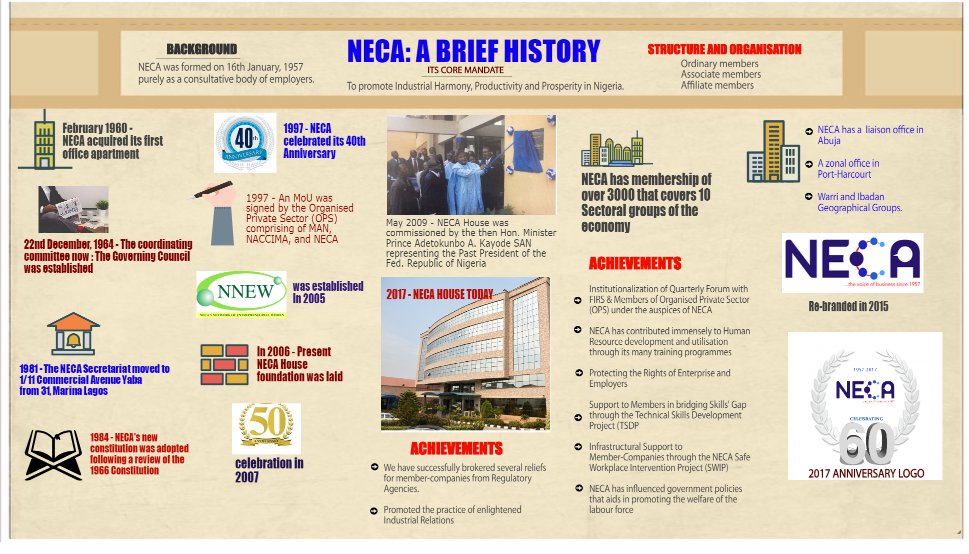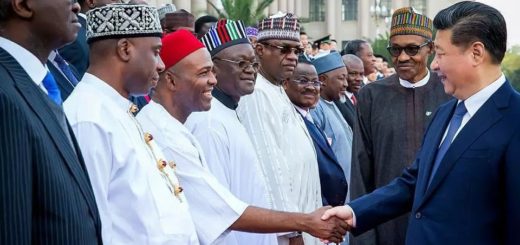Business Essentials Vol 4. No 11
Dear Esteemed Member,
The recently released data on the inflation rate showed a downward trend and improvement in foreign exchange situation. This has impacted the naira favourably in recent time, helped in stabilising the markets and reduced pressures on the economy. We, thus, reviewed recent decisions of the Monetary Policy Committee (MPC) of the CBN which had impacted on the foregoing and its implication for the economy.
From NECA archives, we shared a piece on the causal relationship between the International Labour Organisation and Employers vis-a-vis the tripod relationship existing between the Government, Employers and Workers. Our regular Labour and Employment Law Review and Upcoming Training Programmes were not left out.
Have a pleasant reading.
Timothy Olawale
Editor
In this Issue:
- Monetary Policy Committee’s (MPC) Stance in Managing the Interest and Inflation Rates
- The International Labour Organisation (ILO) and Employers
- Labour & Employment Law: The National Industrial Court
- Upcoming Training Programmes

Get to the Root Cause of Your Burnout If you’re feeling exhausted, overwhelmed, and even depressed at work, you may be burned out. The first step to remedying the situation is to understand what’s causing it. Try tracking how you spend your time for a week, either on paper, in a spreadsheet, or in one of the many apps now available for tracking your time. For each block of time, write down what you’re doing, whom you’re with, and how you feel on a scale of 1–10, where 1 means angry or depressed and 10 means joyful or energized. This will give you a sense of which activities and people are diminishing your energy, so that you can start limiting your exposure to them. The goal is to decrease time spent on tasks, people, and situations that drain you and to increase time on those that replenish you. As much as possible, try to jettison low-value and high-frustration activities. If you find that there are certain relationships that are especially draining, interact with those people as little as possible. Adapted from “Steps to Take When You’re Starting to Feel Burned Out,” by Monique Valcour |
Monetary Policy Committee’s (MPC) Stance in Managing the Interest and Inflation Rates
With the aim of supporting growth and economic recovery, the Monetary Policy Committee of the Central Bank of Nigeria (CBN) at its meeting on 20- 21 March 2017 maintained its benchmark interest rate at 14%, and we expect that this level will be held until 2018. While hiking the key policy rate would be a positive for investor sentiment given that this would push real interest rates into positive territory, we expect that government pressure will prevent the bank from raising the benchmark rate further. Meanwhile, worries over high inflation will preclude any cuts to the interest rate despite the government’s stated desire for cheaper borrowing costs.
Our Views:
More Stable Monetary Policy Rate Decisions Ahead
Following a period of seemingly haphazard monetary policy decisions by the CBN, the bank appears to be adhering to a more predictable monetary policy at present which will likely entail no changes to the key policy rate through the course of the year. The March meeting was the fourth consecutive meeting at which the bank held rates, and while orthodox monetary policy might have led it to hike given that inflation is still very high, there is at least a renewed consistency in its approach compared to last year. In November 2015, the bank confounded expectations by cutting the policy rate by 200bps, even while inflation was rising, before resuming hikes once more in March 2016.
In contrast, the message from the CBN has been fairly similar over the past several meetings, repeatedly observing that it is not capable of righting the Nigerian economy through any actions of its own, and that greater fiscal input is needed to boost growth. While we agree that a pick-up in government revenues in 2017 will see the implementation of fiscal policy play a larger role in the economy’s recovery, we maintain that the CBN can make a substantial impact upon Nigeria’s growth trajectory through allowing greater flexibility in the exchange rate
High Inflation Will Prevent A Rate Cut
Irrespective of this, with regards the monetary policy rate, it is apparent that while government pressure might prevent the CBN from hiking, it is unwilling to bow to government demands and cut while inflation remains high. Finance Minister Kemi Adeosun has publicly called for lower rates, in order to stimulate the economy and to make government borrowing cheaper, but the CBN has publicly refuted this and we do not expect this to change as long as inflation remains at current high levels.
We forecast that inflation rate will remain in double digits over the course of the year, coming in at 13% in December 2017. This would mark a considerable slowdown compared to the 18.6% recorded in December 2016, but is still high. We expect that as the naira is eventually devalued in the second half of 2017, an inevitable hike in petrol prices will contribute to keeping inflation rate high even as such a move will lead to some convergence between the official and black market rates.
Cutting Will Start In 2018
In 2018, we expect that some improvement in Nigeria’s macroeconomic footing will enable the CBN to enact 200bps of cuts over the course of the year. We forecast that inflation will fall to an average 11.5% in 2018, as the naira will cease to depreciate so sharply on the official and parallel markets, and this will enable the bank to cut interest rates in a bid to stimulate consumer demand.
The International Labour Organisation (ILO) and Employers
At the end of the First World War, about ninety-seven years ago, the Peace Treaty signed in Versailles set up the League of Nations whose essentials task was to avert future conflicts. But in the attainment of this task, it was understood that co-operation was most needed between the holders of political, economic and labour power. In other words, that universal and lasting peace ‘‘can be established only if it is based upon social justice.’’ The International Labour Organisation (ILO) which is an association of States was therefore created alongside the League o Nations with the responsibility of setting up international collaboration for the study of labour problems and for the adoption of international labour standards as a guide to social policy. In the ILO, the term ‘labour standards’ is interpreted in its widest sense: the ILO is concerned with both standards at work and standards of living.
The ILO is a specialised agency of the United Nations on social and labour problems in the same way as the World Health Organisation, for example, works to improve the health of people throughout the world. But the ILO differs from other inter-governmental organisations in one important way: it is ‘‘tripartite’’. This means that representatives of employers and of workers as well as those of governments take part in its work. The employers’ and workers’ delegates speak and vote independently. They may disagree with their government or with each other. It is the tripartite system that gives the ILO much of its strength.
The International Labour Conference which is the supreme deliberative body of the Organisation, and sometimes referred to as the ‘‘world parliament of labour’’, is tripartite in character. So also is the Governing Body of the International Labour Office which functions as the Organisation’s executive council.
The tripartite character of the ILO is inevitable. Since the Organisation was to be called upon to concentrate on the conditions of life and work, on the development of industry and on the social and economic situation of its member States, it needed to have a tripartite basis, to allow governments, employers and worker, working in harmony and equilibrium to find solutions to their specific essential problems.
The equal participation of employers’ and workers’ representatives in ILO activities has brought the two parties into a working relationship in the international sphere. This has influenced and has been influenced by the development of industrial relations in the various member states of the Organisation. The state of labour-management relations in a country generally provides a good indication of its approach to social problems. If industrial relations are bad, they poison the social climate and impede economic progress. Good relations on the other hand, can contribute materially to better living standards.
The ILO considers relations between employers and workers ‘good’ when they are based on the full recognition of freedom of association in both theory and practice, and when they enable their representatives to tackle problems of common concern in a spirit of mutual respect and democratic discussion. In furtherance of this objective the ILO adopted, amongst others, international labour instruments on freedom of association, collective bargaining, collective agreements, voluntary conciliation and arbitration, cooperation at the level of the undertaking, and consultation and cooperation between public authorities and employers’ and workers’ organisations. In addition, the ILO aims at promoting greater co-operation between employers and worker through bipartite missions, study courses, expert technical co-operation missions, and publications of monographs on labour- management relations.
The ILO also arranges for the operation of a varying number of Committees both tripartite and bipartite, and experts’ groups either permanently or for the consideration of one or several particular items which are decided by the Governing Body of the Organisation. Of particular importance are the standing industrial committees which bring together, in equal number, government experts, workers and employers to consider labour and social questions of concern to a particular industry. The industries covered include building, civil engineering and public works, chemical industries, coal mines, iron and steel, metal trades, petroleum, textiles and inland transport.
Another point of contact between the ILO and employers is through the medium of the International Institute for Labour Studies. The Institute functions essentially as an advanced staff college for practitioners in the labour and social field. Education for leadership responsibility in the social field as well as research is the chief objectives of the Institute. It follows that its initial job is to try to identify the groups most likely to throw up people who will influence social policy and the patterns of industrial relations. Because of the ILO’s exclusive and peculiar tripartite nature, the Institute naturally looks mainly to Ministries of Labour, to employers’ organisations and to the trade unions for the calibre of people it is looking for, although it also draws from the universities and the professions.
One might say that employers and the ILO have identical purposes: the ILO seeks to ensure universal peace through social justice and employers seek to ensure, on a national level, peace in labour-management relations. But this identity of purposes has not always been easily achieved for, in spite of permanent opportunity for collaboration between governments, employers and workers, a certain amount of opposition between the latter two groups exists, although it may be said that the criticisms of employers are also an active form of collaboration. Albert Thomas, the first Director of the ILO (1919 -1932) once said of the employers: “You are, it seems, the brakemen. So be it, since that is your role. But you are on the train, and whether or not the train knows where it is going, it runs ahead towards its destination. At times slowly, at others more rapidly, but unfailingly, together we are going towards social justice and peace.”
The attitude of employers to international labour standards adopted by the International Labour Conference has always been on their desire to advance social legislation internationally without harming the national interests of each country. In like manner, the majority of employers feel that their attitude towards the standard-setting work of the ILO is a result of their constant contact with reality: just as their undertakings must maintain a high degree of efficiency in order to furnish stable employment and a decent and increasing standard of living to their workers, so the ILO can create a climate for better employment conditions and the standard of living if international labour instruments take into account the real conditions existing in the member States of the Organisation which differ among themselves in climate, average educational level, economic possibilities and cultural traditions. This is why employers continue to insist that international labour standards should have some degree of flexibility so that they do not impose too high a cost on the countries that ratifies them.
The field of technical co-operation, which has been most favoured by employers, is the educational work which the ILO has undertaken. The employers support the development of this activity on all levels, especially locally in response to local needs. Since the creation of the Employers Activities Branch in the International Labour Office the impact of employers’ organisations of ILO’s work in this field has been greater than ever before.
The participation of employers in the work of the International Labour Organisation was stimulated by the creation in March, 1920 of the International Organisation of Employers (IOE), whose purpose is to study social problems of industry and labour throughout the world, and particularly those questions which are examined by the International Labour Conference and the International Labour Office. The global coverage of the IOE’s member-states makes it the most authoritative representative of employers’ interests in the ILO.
Thus, the International Organisation of Employers has contributed to the efforts made by employers’ delegations to obtain compatibility of social legislation with economic requirements on the one hand and with social principles on the other, recognising the essential role of employers’ and workers organisations. It was created for the defense and the development of a social and economic system based on free enterprise, autonomy of social partners and independence of their organisations.
The IOE is not, however, the only employers’ organisation which has regular relations with the International Labour Organisation. Among others may be mentioned the International Chamber of Commerce, the International Federation of Agricultural Producers, the International Shipping Federation, the International Union of Handicrafts, Small and Medium Undertakings, the International Commercial Employers’ Federation and a large number of other regional, national and specialised trade organisations.
Source: NECA archives.
Labour & Employment Law: The National Industrial Court
We continue our enlightenment on the subject matter, which we started in the last edition.
- Powers of the National Industrial Court.
The 1999 Constitution Third Alteration Act, 2011 confers on the National Industrial Court all powers of a High Court. The Court is empowered-
- To confirm a judgment, an award or order made by the Court, tribunal or body mentioned in the matter before it;
- To vary a judgment, an award or order made by the Court, tribunal or body mentioned therein;
- To set aside a judgment, an award or order made by the Court , tribunal or body mentioned therein;
- To order a rehearing and determination on such terms as it thinks just;
- To order judgment to be entered for any party;
- To make a final order or other order on such terms as it may think fit to ensure the determination on the merits of the matter in dispute between the parties;
Other Powers.
- To make an order of mandamus requiring any act to be done
- To make an order of prohibition prohibiting any proceedings cause or matter; and
- To make an order of certiorari removing any proceedings, cause or matter into the Court for any purpose.
- To grant urgent interim reliefs;
- To make a declaratory order;
- To appoint a public trustee for the management of the affairs and finances of a trade union or employees’ organization involved in any organizational disputes;
- To make appropriate order for an award of compensation or damages in any circumstance contemplated by the NICA, 2006 or any Act of the National Assembly dealing with any matter that the Court has jurisdiction to hear ; and
- To make an order of compliance with any provision of any Act of the National Assembly dealing with any matter that the Court has jurisdiction to hear.
- Appeals from the National Industrial Court of Nigeria
Section 243(2) and (3) of the Constitution of the Federal Republic of Nigeria (Third Alteration) Act 2010 provides as follows:
- An Appeal shall lie from the decision of the National Industrial Court as of right to the Court of Appeal on questions of fundamental rights as contained in Chapter IV of this Constitution as it relates to matters upon which the National Industrial Court has jurisdiction.
- An Appeal shall only lie from the decision of the National Industrial Court to the Court of Appeal as may be prescribed by an Act of the National Assembly: Provided that where an Act or Law prescribes that an appeal shall lie from the decisions of the National Industrial Court to the Court of Appeal, such Appeal shall be with the leave of the Court of Appeal.
Without prejudice to the provisions of Section254C (5) of this Act, the decision of the Court of Appeal in respect of any Appeal arising from any civil jurisdiction of the National Industrial Court shall be final.
Culled from the website of the National Industrial Court

APR 26 Nigerian Labour Law When: April 26-28, 2017 |
MAY 10 Planning for Golden Years When: May 10-12, 2017 |
MAY 25 Exceptional Customer Care When: May 24-25, 2017 |
For further details please contact Adewale (08069720364) adewale@neca.org.ng
Visit www.neca.org.ng






Recent Comments